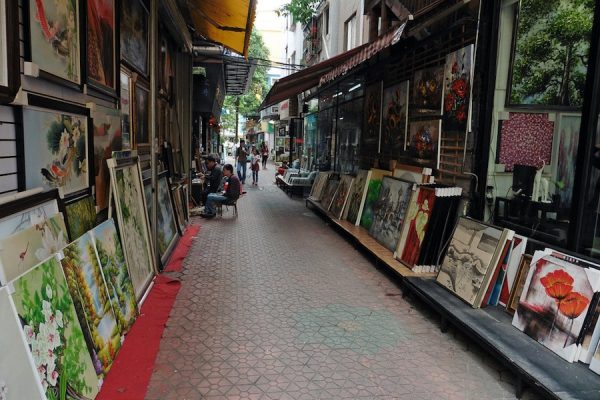Making radical political and urban art in Tangier is easy – as long as you don’t criticise, offend or upset either the reigning King, or representatives from the Muslim faith. A collective of young political artists are slowly finding their way through this unusual paradigm, producing acerbic art which has, as of yet, not led to terminal conflict with such authorities.
The Independent Border Art Factory has been open for 9 months, situated some 50 meters from the hotel El Muniria – where William S. Burroughs wrote The Naked Lunch in 1959 – at the edge of the Spanish Quarter, and its atmosphere and energy would not be out of place in a western gallery.
The factory is managed by artist Azad Farishtah, who has recently moved from Montreal to Tangier and, through her own work, is currently exploring issues of migration from sub-Saharan Africa. The factory provides space for other artists to work, sell, and to hold exhibitions. It also facilitates opportunities for young creative entrepreneurs, with the space there also available to graphic designers, web designers, editors and writers.
Only several weeks ago, it hosted a ‘multi-medium festival’ for artists of any genre to collaborate on a theme of ‘Barzakh’ or ‘Limbo’, specifically ‘how do borders (political, geographic, cultural) help to create or maintain a state of limbo’?
It quickly becomes apparent that the name ‘Border Art Factory’ refers unequivocally to political and cultural associations, wholly relevant to the migrant/refugee situation currently vexing Europe. In Tangier, as one of the most northern ports in Africa and closest to Europe, its relevance seems especially focused.
While referencing conventional and gender politics within a Muslim cultural landscape is undeniably difficult, anti-western sentiment is perhaps less difficult, and possibly predictable. This, alongside criticism of other Arab states and their financially inter-dependent relationship with the west, appears to exist in the work of French-Algerian artist Sonia Merazga.
A large mural painted following a journey to Iran depicting the Shah with an image of Kim Kardashian holding a bottle of coca cola at his feet appears to roundly dismiss corporate western values. Another mural of a Saudi Arabian sheik with a petrol pump in his mouth and dollar signs forming the hood of his costume, with the words ‘Power is Beauty’, comments again upon materialism, and a complicated economic inter-dependency. Although controversial, these are sentiments which also exist in some quarters of the west.
Throughout the space, large paintings, interesting and innovative installations and the assembled tools of artists provide a sense of a journey and progression. Photographer/videographer Ayoub Al Jamal and painter/sculptor Narjiss Jamoussi tell me a website is being developed, and that the collective are finding their feet.
There is discussion of international links with other artists and art-houses, and the name of artist Omar Mahfoudi is raised repeatedly – it seems he is also the co-founder, and works well with Azad – as examples of his art are pointed out to me. His large murals, tables created from tiled photographs and ripped paper, and installations – some controversial – are quickly sold.
You can find Border Factory on Facebook here.
Words by Geoffrey Billett







